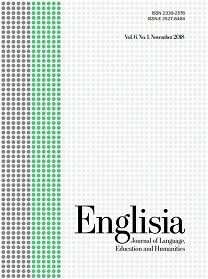I LOVE TEACHING: The reflective stories of English teachers at achieving shools in Banda Aceh
DOI:
https://doi.org/10.22373/ej.v6i1.3849Keywords:
Learners-centred instructions, teaching strategies, achieving schoolsAbstract
The study explored the teachers teaching strategies in six high achieving schools in Banda Aceh. One main purpose of the study was to explore particular strategies teachers use in conducting teaching effectively. The study was approached using the qualitative classroom research. The settings of the study were six high achieving secondary schools in Banda Aceh. The data of the study were collected through in-depth semi-structured Interview, observation and also focus group discussion. The data which was analysed using coding techniques reveals that most teachers interviewed suggested that they feel teaching at schools was at ease, and this due to mostly their extensive teaching experiences, trainings and Students’ learning passion.
References
Azra, A (2002). Paradigma baru pendidikan nasional: Rekonstruksi dan demokrasi. Jakarta: Kompas.
Bjork, C (2005). Indonesian education: Teachers, schools, and central bureaucracy. New York and London: Routledge.
Brown, J. D., and Rodgers, T. S. (2002). Doing second language research: An introduction to the theory and practice of second language research for graduate/master's students in TESOL and applied linguistics, and others. Oxford University Press.
Buchori, M (2001). Notes on education in Indonesia. Jakarta: Jakarta Post and Asia Foundation.
Finn, P. J. (1999). Literacy with an attitude: Educating working-class children in their own self-interest. Albany: State University of New York Press.
Freire, P. (1993). Pedagogy of the oppressed. New York: The Continuum International Publishing Group Inc.
Kohl, H (1992). ‘I won’t learn from you’ and other thoughts on creative Maladjustment. New York: The New Press.
Louws, M.L., Meirink, J.A., Veen, K. V. & Driel, J. H (2017). Exploring the relation between teachers’ perceptions of workplace conditions and their professional learning goals, Professional Development in Education 43(5), 770-788
McCaughtry, N, Kulinna, PH, Cothran, D, Martin, J, and Faust, R (2005). Teachers mentoring teachers: A view over time. Journal of Teaching in Physical Education, 24, 326–343
McCombs, BL, and Miller, L (2007). Learner-centered classroom practices and assessments: Maximizing student motivation, learning and achievement. Thousand Oaks: Corwin Press.
Shor, I. (1992). Empowering education: Critical teaching for social change. Chicago and London: The University of Chicago Press.
Winarto, Y. T. (2006). Family education and culture in Indonesia: the complex, intermingled, and dynamic phenomena. Paper presented at the International Conference on Cross-cultural Perspectives on Family Education in Southeast Asian Countries, Taiwan.
Wolk, S (1998). A Democratic classroom. Portsmouth: Heinemann
Zulfikar, T (2014). Indonesian education: Its attempt to implement progressive learning environment. Edited Book, will be published by IJPE.
Zulfikar, T. (2009). The making of Indonesian education: An overview on empowering Indonesian teachers. Journal of Indonesian Social Science and Humanities 2(1), 13-36
Zulfikar, T. (2013). Looking from within: The progressive education in Indonesia. International Journal of Progressive Education, 9(3), 124-136.
Zulfikar, T. (2014). Indonesian education: Its effort for progressive learning environment. Handbook of Progressive Education (HOPE)-published by International Journal of Progressive Education: New York. INASED
Downloads
Published
Issue
Section
License
Proposed Policy for Journals That Offer Open Access
Authors who publish with Englisia journal agree to the following terms:
- Authors retain copyright and grant the journal right of first publication with the work simultaneously licensed under a Creative Commons Attribution License that allows others to share the work with an acknowledgement of the work's authorship and initial publication in this journal.
- Authors are able to enter into separate, additional contractual arrangements for the non-exclusive distribution of the journal's published version of the work (e.g., post it to an institutional repository or publish it in a book), with an acknowledgement of its initial publication in this journal.
- Authors are permitted and encouraged to post their work online (e.g., in institutional repositories or on their website) prior to and during the submission process, as it can lead to productive exchanges, as well as earlier and greater citation of published work (See The Effect of Open Access).









